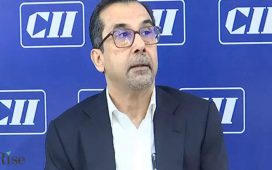Unlock the Editor’s Digest for free
Roula Khalaf, Editor of the FT, selects her favourite stories in this weekly newsletter.
The boss of the UK’s largest supermarket chain said he “absolutely accepted” he was “well paid” before investors approved his £10mn pay package on Friday, at a time when UK executive remuneration has risen up the corporate agenda.
Tesco chief executive Ken Murphy’s pay more than doubled to £9.9mn in the year to the end of February, thanks largely to performance-linked bonuses of £8.3mn — making him one of the best paid British supermarket bosses.
Asked about his remuneration ahead of a non-binding shareholder vote on Friday, Murphy said: “[I] absolutely accept that I’m well paid” but added that remuneration was set by the board “as delegated by the owners of the company, the shareholders” and was variable, based on stretching targets.
A total of 93.4 per cent of the votes were cast in favour of the remuneration report on Friday and all 22 resolutions passed.
Tesco’s shareholder meeting comes as a string of large UK companies have sharply raised pay for their top executives in recent months to resolve a widening gulf with their US peers.
FTSE boards have come under pressure to raise chief executive remuneration in order to compete with their transatlantic rivals, with shareholders at companies including AstraZeneca recently voting through big pay increases for their chief executives, despite opposition.
Murphy’s pay is currently significantly higher than rivals, with the exception of a proposed pay package of almost £15mn for Ocado’s chief executive Tim Steiner, which attracted the ire of investors at its annual meeting in April. The boss of Sainsbury’s, the second-largest supermarket, was paid just under £5mn last year.
Since Murphy joined the retailer in October 2020 he has presided over a 15 per cent increase in its share price. Earlier this year the FTSE 100 company forecast rising profits and announced a £1bn share buyback.
Ahead of the general election on July 4, Murphy said he wanted “stability and consistency” from the next government “because they allow businesses to plan and to invest and I think that they’re critical characteristics of any government”, declining to back any party.
On Friday, Tesco said it was winning market share from other grocers “more than at any other time in the past two years” as it posted a 3.4 increase in like-for-like retail sales to £15.3bn in the 13 weeks to May 25, driven by fresh food and clothing.
Customers were “switching to us from other retailers, shopping with us more often and with more in their baskets”.
Murphy added the business was “well positioned for the months ahead” and maintained its guidance for retail adjusted operating profit of at least £2.8bn for the year.
He said he expected inflation to remain in the “very low single digits” for the rest of the year. Annual food price growth fell to 3.2 per cent in May, down from 3.4 per cent in April and the lowest since February 2022.









